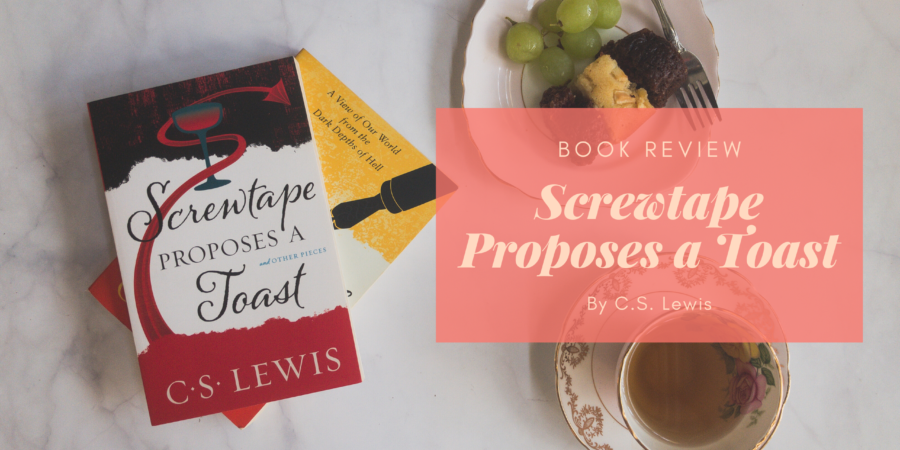I’ve read The Screwtape Letters a long time ago, so I was pretty surprised to find out that there’s a (very short) sequel: Screwtape Proposes a Toast. Of course, I bought this.
Screwtape Proposes a Toast is a collection of essays by C.S. Lewis, put together by him shortly before its death. It opens with the titular essay, where Screwtape offers pieces of advice to the graduating cohort of demons, and then goes on to various essays and speeches that he gives, all touching on the topic of Christianity.
It may come as a surprise, but my favourite essay in this little volume was not Screwtape Proposes a Toast. While it as fun to go back into the mind of Screwtape and take a look at how the other side things, the essay that resonated the most with me was the second one in this collection: The Inner Ring.
The Inner Ring is a memorial oration that Lewis gave at King’s College and concerns a universal desire: to belong to a certain set. Lewis opens with a quote from Tolstoy’s War and Peace, and then goes on to talk about the longing to belong and how that, if not harnessed correctly, can lead to corruption. I particularly love this quote:
“In the whole of your life as you now remember it, has the desire to be on the right side of that invisible line ever prompted you to any act or word on which, in the cold small hours of a wakeful night, you can look back with satisfaction?”
What a fantastic reminder that if we act to impress people, it must be in a way that we can be proud of. If the inner group we want to join requires us to bend the rules or close an eye to things, it’s not a group we should want to join.
Other essays I particularly liked include ‘Is Theology Poetry’ and ‘An Obstinacy in Belief’. The only essay that left me a little confused was ‘Transposition’, which is about the speaking of tongues and the act of the Holy Spirit. I’ll have to re-read that essay again soon.
Overall, this is a short collection of essays on Christianity that will appeal to Christians and fans of C.S. Lewis who don’t mind him talking mainly about Christianity. Fans of The Screwtape Letters: you will enjoy this follow up, but do bear in mind that this is just one essay in the book, not the bulk of the book.

I think my copy of The Screwtape Letters actually comes with “Screwtape Proposes a Toast” in back, which makes a lot of sense!
I agree with you about “The Inner Ring.” I like how Lewis touches upon experiences that I think people can relate to. I think most people want to believe that, hey, we’re not that bad. But he has a way of reminding readers that simple, everyday actions also matter. Being your best self means more than not going out and robbing a bank on Saturday.
That’s so cool! The copy I have at home is just the original.
Yes, he does! It was such a great speech (I think it was originally something he gave to students?), I wish I could hear it in person!
Lewis is probably my favorite author…even though I don’t always agree with him, he always makes me think. I just saw an interesting article on the Gospel Coalition blog about “The Inner Ring” and the musical “Hamilton” – https://www.thegospelcoalition.org/article/hamilton-lewis-inner-ring/
Thanks for the link!
Yes, I don’t agree with all of Lewis’s theology either (nor Chesterton, another favourite of mine, for that matter), but he’s a great writer and I like reading and thinking over his works.
I’m so grateful to see Lewis AND Chesterton cited as worth reading – even if we agree that there are some areas of disagreement; they both make you think! I am currently teaching a High School class on Screwtape Letters for Homeschoolers’ enrichment, and am finding as my 3rd and 4th times through the book that there is still a LOT that I am learning “for the first time”! I also routinely teach a Public Speaking class, and as part of our impromptu speaking practice, I give the option for me to read aloud a favorite Chesterton quote, ask them to agree or disagree – and explain why. Without fail, the challenge from Chesterton is labeled by the students as the hardest source – and only the brave (or over-confident) will attempt it!
I think the fact that I don’t entirely agree with them makes them even more worth reading – I get to also examine my beliefs at the same time.
Chesterton is a fantastic writer but he can be hard to explain! I adore many of his essays (especially those from Heretics and Orthodoxy) but it can be a bit hard to explain why. And I’ve found that some people find his language a bit inaccessible, which is a pity!